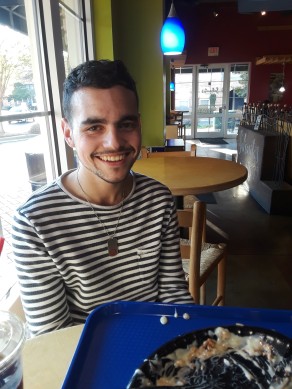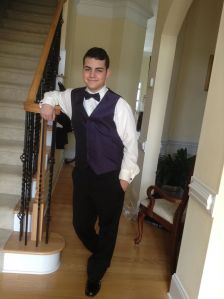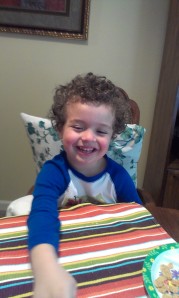 I was stress googling some of my son’s symptoms trying to find the least harmful possible explanation after the latest visit to his neurologist. I came across the words Friedreich’s Ataxia and clicked the link, hoping that Friedreich was the person who found the cure to the disease and all would be well. I imagined Freidreich an eccentric older man, with wild hair, working alone obsessively in his laboratory for years. And then at the end of one exhausting day, nearly broken by frustration, a moment of inspiration struck and he realized what he had been overlooking all along. He then ran to the old chalk board covered in complicated chemical formulas, and changed a couple of coefficients. Great Scott! But of course, it was so obvious now! It had been there all along! Next he would move over to a row of test tubes, knocking over a few beakers in his excitement. He would combine a couple of ingredients and viola! He would hold up the test tube in triumph, his eyes wild with excitement. Mr. Friedreich would forever be memorialized in med school text books and this terrible disease he had just cured would now be know as Friedreich’s Ataxia.
I was stress googling some of my son’s symptoms trying to find the least harmful possible explanation after the latest visit to his neurologist. I came across the words Friedreich’s Ataxia and clicked the link, hoping that Friedreich was the person who found the cure to the disease and all would be well. I imagined Freidreich an eccentric older man, with wild hair, working alone obsessively in his laboratory for years. And then at the end of one exhausting day, nearly broken by frustration, a moment of inspiration struck and he realized what he had been overlooking all along. He then ran to the old chalk board covered in complicated chemical formulas, and changed a couple of coefficients. Great Scott! But of course, it was so obvious now! It had been there all along! Next he would move over to a row of test tubes, knocking over a few beakers in his excitement. He would combine a couple of ingredients and viola! He would hold up the test tube in triumph, his eyes wild with excitement. Mr. Friedreich would forever be memorialized in med school text books and this terrible disease he had just cured would now be know as Friedreich’s Ataxia.
Unfortunately, such a scenario only exists in movies and the optimistic imagination of a worried parent. There is no cure or treatment for Friedreich’s Ataxia. It is a rare, degenerative, neuromuscular disease. My son Andrew received the devastating news that he indeed did have Friedreich’s Ataxia, about 30 days after my evening of searching his symptoms. The neurologist matter-of-factly informed us Andrew’s unsteady gait and balance problems that caused our initial concern would only get worse. He told us that within 5 years he would probably been in a wheelchair, followed by blindness, deafness, loss of speech, and finally a premature death.
This was crushing news for me, but Andrew handled it incredibly well. Andrew is only 20 years, old and he decided to speed up his education and enrolled in an intensive all-day programming boot camp run by the University of North Carolina in Charlotte. He has worked through this course work with amazing dedication and is now about to complete it. He has not wasted time feeling sorry for himself. The picture above with his beaming smile was taken after another neurologist visit in which we discussed his future.
In the months that followed I found a non-profit group, Friedreich’s Ataxia Research Alliance, and learned that medical breakthroughs don’t come from eccentric scientists working alone in their laboratories as I had imagined. The breakthroughs come slowly through the work of universities, scientists, doctors, pharmaceutical companies, hospitals, clinical trials, and most importantly the patients themselves. Each project, whether successful or not, adds a little to our collective understanding and inches us a little bit closer to a cure. Research on Friedreich’s Ataxia has been going on for decades. There are a few exciting clinical trials going on now and a few more getting ready to start.
It is like a relay race expanding careers and lives, and now the baton has been passed to Andrew for him to play his part. Andrew didn’t choose this race, but is facing it bravely, and we are so proud of him. He is running for himself, hoping for a cure before his disease progresses too much further. He is running for the courageous patients that came before him. In life they gave their precious time, blood, and tissue samples to help find cure. And when that cure did not arrive in time they for them, they donated their organs to research in death. He is running for kids now who are happy and healthy, symptom free and blissfully unaware that they are carrying the gene for Friedreich’s Ataxia. That they may forever remain symptom free and not endure the pain that he has.
For info on how to help find the cure to Freidreich’s Ataxia see the Lend us Some Muscle campaign.














